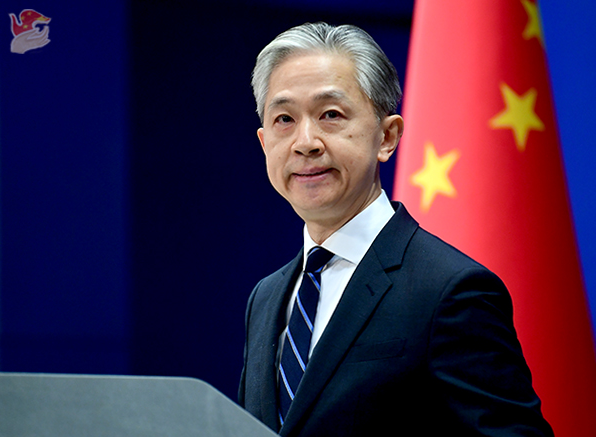China FO Presser – Aug 15, 2023

Chinese Foreign Ministry spokesperson Wang Wenbin held a Regular Press Conference on August 15, 2023. The Q-A on Afghan scene is tweaked to appear upfront.
Excerpts
China Daily: On August 15, 2021, the Resolute Support Mission troops led by the US and NATO were fully withdrawn from Afghanistan, and the Afghan Taliban retook power. Now two years have passed. How does China view the current situation in Afghanistan?
Wang Wenbin: On this date two years ago, the whole world witnessed the “Kabul moment” when the US hastily withdrew its troops from Afghanistan. The event left behind profound lessons which, to this day, are still worth deep thought. What happened in Afghanistan marked a military, political and counter-terrorism failure of the US in Afghanistan, and once again proved that military intervention, political infiltration and “democratic transformation” from the outside will not work and will only breed turmoil and disaster.
As a Chinese saying goes, good neighbors wish each other well. Over the past two years, the Chinese people have cared for the livelihood, safety and future of the Afghan people. As Afghanistan’s biggest neighbor, China has helped Afghanistan restabilize and rebuild the country and advanced the political settlement of the Afghan issue in a responsible and constructive way. We have provided large amounts of material aid in various forms through land, sea and air transportation, expanded the import of quality Afghan agricultural products such as pine nuts, granted zero-tariff treatment to 98 percent of the tariff lines of Afghan products, steadily advanced practical cooperation between the two countries, and helped Afghanistan improve its capacity for self-driven development.
Two years on, with the active support of Afghanistan’s neighbors and other countries in the region, the transition in Afghanistan has been generally stable, and the future of the nation is back in the hands of its people—a historic achievement. The interim government has taken a number of practical measures in recovering its economy, improving people’s livelihood, prohibiting narcotics, fighting corruption and safeguarding security. The world needs to view these efforts objectively and fairly. In the meantime, the international community still has expectations for Afghanistan in building a more broad-based and inclusive government framework and safeguarding the rights and interests of all its citizens, including women and ethnic minorities. It is hoped that the interim government will take active measures to better respond to these expectations of the Afghan people and the rest of the world.
Over the past two years, a certain country has cut off aid, frozen Afghanistan’s assets and imposed sanctions, worsening the suffering of the Afghan people. According to data from the UN, the number of Afghan people in dire need of humanitarian aid has doubled from 14.4 million to 29.2 million. To achieve lasting security, Afghanistan must first and foremost address the worrying humanitarian situation. Relevant country needs to learn from what happened in Afghanistan, deliver on the promise of aid to the country, and ensure all frozen assets of Afghanistan will be used as soon as possible to address the urgent livelihood needs of its people.
The terrorist forces dwelling in Afghanistan still pose a major security threat to the country, the region and the wider world. The world expects Afghanistan to deliver on its commitment, prevent its territories from being used by any terrorist force, and dismantle and eliminate all terrorist organizations. The international community needs to enhance bilateral and multilateral cooperation on counter-terrorism and security, and support Afghanistan in taking a multi-pronged approach and addressing both the symptoms and the root cause of the challenges it faces, so as to realize lasting peace, stability and development at an early date.
CCTV: Today is China’s first National Ecology Day. What does having such a day mean to China’s part in global ecological and environmental governance?
Wang Wenbin: Today is China’s first National Ecology Day, which is a landmark initiative reflecting the importance of ecological civilization in the new era, our determination in building a beautiful China, China’s active participation in the global environmental and climate governance and our firm commitment to building a community with a shared future for mankind.
Eighteen years ago today, the then Secretary of the CPC Zhejiang Provincial Committee Xi Jinping said for the first time “Lucid waters and lush mountains are invaluable assets” during an inspection tour in Yucun Village of Anji County, Huzhou City. Over the past 18 years, this important philosophy has created nationwide resonance. It has not only contributed to the harmony between humanity and Nature in China but also injected China’s wisdom to global environmental governance. Guided by this philosophy, China has carried out holistic and systematic governance of its mountains, rivers, forests, farmlands, lakes, grasslands and deserts, and achieved remarkable progress in ecological conservation and green development, showing the world a beautiful China with bluer skies, greener mountains, and cleaner waters.
In the face of environmental challenges, humanity is a community with a shared future. China is an advocate, doer and trailblazer in global environmental and climate governance. We are one of the fastest countries in terms of lowering energy intensity, the largest contributor to global ozone layer protection and the biggest country in terms of energy conservation and the use of new energy and renewable power.?China will achieve the biggest reduction in carbon emission intensity within the shortest time in global history.
Planet Earth is humanity’s shared home. Protecting it requires concerted efforts of us all. Upholding the vision of building a community of life for man and Nature and a community of all life on Earth, China stands ready to work with all sides to implement nationally determined contributions (NDCs) targets, advance efforts in mitigation and adaptation and jointly build a clean and beautiful world.
Prensa Latina: Next month Cuba will host the G77 plus China Summit. What is your opinion about this event? What comments do you have about the Cuban presidency of this group?
Wang Wenbin: The Group of 77 and China is a mechanism for cooperation among developing countries. It has upheld international fairness and justice and safeguarded the common rights and interests of developing countries. China appreciates the work of Cuba as the rotating chair for 2023, and supports Cuba in hosting the Group of 77 and China Havana Summit. We look forward to positive contribution of the summit to greater solidarity, closer cooperation and joint response to challenges among developing countries.
Reuters: Does China plan to launch new war games or major military exercises, once William Lai returns to Taiwan on Friday?
Wang Wenbin: Lai Ching-te clings stubbornly to the separatist position for “Taiwan independence”. He is a troublemaker through and through. The US and the Taiwan authorities arranged for Lai to engage in political activities in the US in the name of having a “stopover”. This seriously violates the one-China principle, and gravely undermines China’s sovereignty and territorial integrity. The fact once again shows that the fundamental cause of the continued tensions in the Taiwan Strait is the Taiwan authorities’ attempt to solicit US support for “Taiwan independence” and that the US is bent on using Taiwan to contain China.?
The Taiwan question is the core of the core interests of China, the bedrock of the political foundation of China-US relations, and the first red line that must not be crossed in China-US relations. We urge the US to abide by the one-China principle and the three China-US joint communiqués, deliver on its commitment of not supporting “Taiwan independence” or “two Chinas” or “one China, one Taiwan”, stop all forms of official interaction with Taiwan, stop conniving at and supporting “Taiwan independence” separatist forces and their separatist activities and stop fudging and hollowing out the one-China principle. China is closely following the developments of the situation and will take resolute and strong measures to safeguard its sovereignty and territorial integrity.?
Kyodo News: We learned that Japanese Prime Minister Fumio Kishida sent a ritual offering to the Yasukuni Shrine in a private capacity today. Also, Cabinet minister Sanae Takaichi paid a visit to the Yasukuni Shrine. Do you have any response?
Wang Wenbin: Seventy-eight years ago today, on August 15, 1945, Japan accepted the Potsdam Proclamation and announced unconditional surrender. The Chinese people, together with the people of the world, defeated the Japanese militarist aggressors and fascism. It was a decisive battle between justice and evil, between light and darkness, and between progress and reaction. This great victory will forever be remembered in the history of the Chinese nation and the pursuit of justice for all humanity.
The Yasukuni Shrine, where World War II Class-A war criminals are honored, is a spiritual tool and symbol of the wars of aggression launched by Japanese militarists. The negative move of Japanese political leaders on the issue of the Yasukuni Shrine once again shows the Japanese side’s erroneous attitude toward historical issues. The Chinese side has lodged solemn démarches to the Japanese side and stated its stern position.
I need to stress that earnestly facing up to and deeply reflecting on the history of aggression is an essential prerequisite for Japan to restore and develop normal relations with its Asian neighbors after World War II. We urge the Japanese side to earnestly draw lessons from history, stick to the path of peaceful development, take concrete measures to make a clean break with militarism and avoid further losing the trust of its Asian neighbors and the international community.
CRI: The terrorist attack at Shah Cheragh, a Shiite shrine in the southern Iranian city of Shiraz, killed one and injured nine. ISIS claimed responsibility for the attack. What’s China’s comment??
Wang Wenbin: We strongly condemn the attack. China firmly opposes all forms of terrorism and supports the Iranian government and its people in fighting extremist and terrorist forces and safeguarding national peace and stability.?
Bloomberg: What does China see as the significance of the meeting of the US, Japan and South Korea later this week?
Wang Wenbin: China opposes relevant countries assembling exclusionary groupings, and practices that intensify antagonism and undermine the strategic security of other countries. China hopes that relevant countries will act in line with the trend of the times and contribute to regional peace, stability and prosperity.
CCTV: According to a Japanese lawmaker who accompanied Taro Aso, Vice President of the Liberal Democratic Party and former Prime Minister of Japan, on his visit to Taiwan, Aso had discussed his remark in Taiwan about “a readiness to fight” and “deterrence” with the Japanese government beforehand, and the remark is in line with Japan’s official view. What is your comment?
Wang Wenbin: Taiwan is part of China. The Taiwan question is purely China’s internal affair that brooks no foreign interference. China has made serious démarches to Japan over its certain politician’s visit to Taiwan and his irresponsible remarks.
Japan illegally occupied Taiwan, exercised colonial rule over the region for half a century, and committed atrocious crimes. The Cairo Declaration issued by China, the U.S. and the U.K. in 1943 made it clear that Taiwan and all the other territories Japan stole from China shall be restored to China. Article 8 of the Potsdam Proclamation in 1945 reaffirms this. The Instrument of Surrender signed by Japan in 1945 says explicitly that Japan accepts the Potsdam Proclamation. The China-Japan Joint Statement signed in 1972 when the two sides normalized diplomatic relations states that the Japanese government fully understands and respects the position of the Chinese government that Taiwan is an inalienable part of China’s territory and declares the commitment to Article 8 of the Potsdam Proclamation. In 1978, the two countries concluded the Treaty of Peace and Friendship between China and Japan, which affirms the principles set out in the joint statement in legal form. The third and fourth political documents concluded in 1998 and 2008 respectively both reiterate Japan’s commitment to the position on the Taiwan question stipulated in the joint statement. Japan has more than once made serious commitments to China on the Taiwan question, including not supporting “two Chinas”, “one China, one Taiwan” or “Taiwan independence”, and only maintaining people-to-people and region-to-region exchanges with Taiwan. Those are the historical context of the issue, and the principles and position that Japan must abide by.
I wish to stress that the Taiwan question bears on China’s core interests, the political foundation of China-Japan relations, and basic trust and principles between the two countries. Japan needs to adhere to the one-China principle and the spirit of the four political documents between China and Japan, and take concrete action to honor its political commitment and related statements. China is ready to take all measures necessary to firmly safeguard its sovereignty and territorial integrity.
https://www.fmprc.gov.cn/eng/xwfw_665399/s2510_665401/2511_665403/202308/t20230815_11127173.html
-
Book Shelf
-
 Book Review
DESTINY OF A DYSFUNCTIONAL NUCLEAR STATE
Book Review
DESTINY OF A DYSFUNCTIONAL NUCLEAR STATE
- Book ReviewChina FO Presser Where is the fountainhead of jihad?
- Book ReviewNews Pak Syndrome bedevils Indo-Bangla ties
- Book Review Understanding Vedic Equality….: Book Review
- Book Review Buddhism Made Easy: Book Review
- Book ReviewNews Elegant Summary Of Krishnamurti’s teachings
- Book Review Review: Perspectives: The Timeless Way of Wisdom
- Book ReviewNews Rituals too a world of Rhythm
- Book Review Marx After Marxism
- Book Review John Updike’s Terrorist – a review
-
-
Recent Top Post
-
 CommentariesTop Story
India’s Migration Dilemma
CommentariesTop Story
India’s Migration Dilemma
-
 Commentaries
Crowd Management Blues
Commentaries
Crowd Management Blues
-
 Meher Baba SpeaksNews
Meher Baba Loved Them Too…
Meher Baba SpeaksNews
Meher Baba Loved Them Too…
- Commentaries Record Pentagon spending bill and America’s hidden nuclear rearmament
-
 CommentariesNews
Ides of trade between India and Pakistan
CommentariesNews
Ides of trade between India and Pakistan
-
 Commentaries
How sustainable is the rhetoric of India-China Bhai-Bhai
Commentaries
How sustainable is the rhetoric of India-China Bhai-Bhai
-
 CommentariesTop Story
New Set of Diplomatic Strains with Canada
CommentariesTop Story
New Set of Diplomatic Strains with Canada
-
 News
Ratan Tata’s Legacy
News
Ratan Tata’s Legacy
-
 Commentaries
India’s Strategic Push on the World Stage
Commentaries
India’s Strategic Push on the World Stage
- Commentaries Veils of Resistance
-
AdSense code
















